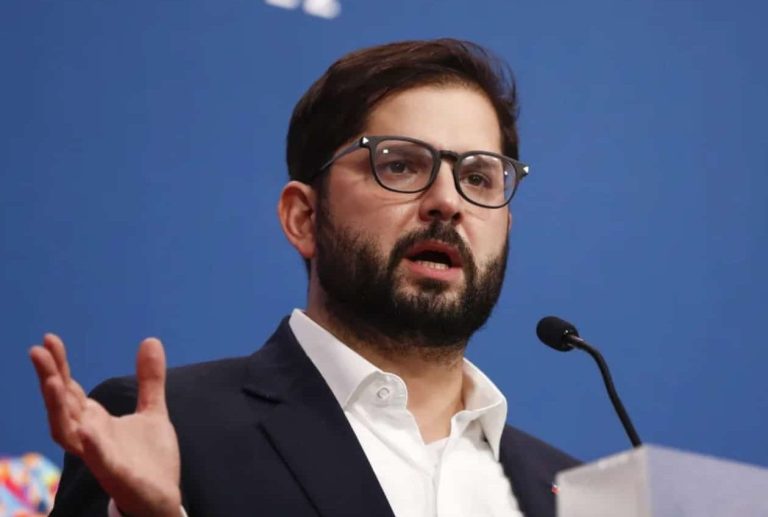11 de noviembre 2022

Children of Exile: The Births “Sowing Hope” in the Camp of Nicaraguan Farmers

PUBLICIDAD 1M
PUBLICIDAD 4D
PUBLICIDAD 5D
“Costa Rica isn’t a base for terrorist groups,” stated Rodrigo Chaves, Costa Rica’s president, in response to the Nicaraguan dictator’s accusations

I thank Gabriel Boric for not remaining silent. Evo: Enough of justifying the atrocities against freedom and justice committed by Daniel Ortega!
Chilean president Gabriel Boric criticized the Sandinista “triumph” in Nicaragua’s November 6 municipal elections. “An electoral process held without freedom or reliable electoral safeguards, and with opposition leaders imprisoned or banished, isn’t democracy anywhere in the world,” he stated.
The Supreme Electoral Council in Nicaragua declared the Sandinista Front the electoral winner in 100% of the country’s 153 municipalities. The electoral powers in Nicaragua are all controlled by authorities tied to the dictatorship of Daniel Ortega and Rosario Murillo.
“We’ll continue using the multilateral forums to push for Nicaragua to guarantee the reestablishment of the democratic guarantees and freedoms that form part of the rule of law, and for an end to all attacks against those in the opposition,” Boric wrote on his Twitter account.
According to the latest data from the inter-American Commission for Human Rights, there are currently over 220 political prisoners, amid the ongoing sociopolitical crisis in Nicaragua.
It’s not the first time that Boric has openly criticized Ortega, who’s been in power for over 15 years. Diverse sources have denounced the Ortega regime as authoritarian, with repeated human rights violations and electoral fraud.
Last September, during his participation at the 77th annual UN General Assembly, the Chilean leader called on that body to “continue working for the release of the political prisoners in Nicaragua.”
Since Boric’s time as a Congressional deputy, before he took up residence at Chile’s La Moneda presidential palace, he’s been critical of Latin America’s authoritarian governments. He has repeatedly stated that defending human rights is his overriding priority.
“I really find it annoying when you’re on the left that you can condemn human rights violations in Yemen or El Salvador, but you’re not supposed to mention Venezuela or Nicaragua,” he expressed in September, during a talk at Columbia University in New York.
Boric’s position has earned him insults from Ortega, who called him a “lap dog” during an activity at the end of September commemorating an anniversary of Nicaragua’s National Police.
“The government that wants to receive the applause of the Yankee empire and of some European Union governments, emerges there like a lap dog, to say that the political prisoners in Nicaragua must be freed,” Ortega stated, in allusion to Boric.
Costa Rican president Rodrigo Chaves also responded to the Nicaraguan dictator’s offensive allegations of the previous day, when Ortega called Costa Rica a base for “terrorists” groups. “Terrorists” is how Ortega habitually refers to members of the opposition who’ve had to flee persecution and violence from Nicaragua’s police, paramilitary and fanatical party followers.
“Costa Rica isn’t a base for any terrorist group, and the government adheres strictly to the norms of international agreements. We’re not offering refuge to any terrorist, much less so they can attack or plan attacks against any neighboring country,” Chaves stated during a meeting with his cabinet.
“We want to maintain cordial relations with all the world’s countries, and we’ll continue along that line, as an icon of peace and a shining example to the world of how democracy can function,” the Costa Rican leader assured.
During the closing ceremony of a Sandinista Youth Congress, Ortega praised the fact that there’d been no violence in Nicaragua during the [November 6] voting. “Even though there were plans facilitated by the Yankees, by the European governments, whose ambassadors here conspire with the terrorists, to offer them financing to promote violence.”
Ortega continued: “despite the millions they gave them in Costa Rica, which is a base for terrorists and that has them there, they didn’t succeed in provoking violent actions, because our people are convinced that a vote for the progress and welfare of a country is worth more than a drop of blood.”
This article was originally published in Spanish in Confidencial and translated by Havana Times.
PUBLICIDAD 3M
Confidencial es un diario digital nicaragüense, de formato multimedia, fundado por Carlos F. Chamorro en junio de 1996. Inició como un semanario impreso y hoy es un medio de referencia regional con información, análisis, entrevistas, perfiles, reportajes e investigaciones sobre Nicaragua, informando desde el exilio por la persecución política de la dictadura de Daniel Ortega y Rosario Murillo.
PUBLICIDAD 3D